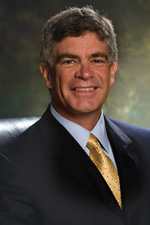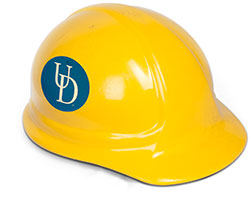

Never before has "Building a Safer World" been a more complex or more challenging proposition. As globalization enables unprecedented opportunities for transnational understanding and partnership, it enables, too, unprecedented opportunities for conflict. Threats to national security are many, and there's scarcely a sector that doesn't introduce a potential vulnerability. In a global world, a "safe nation" is a matter of degrees. But those degrees matter.
The University of Delaware is helping to make the U.S. — and the world — safer places to be. We've long worked with defense agencies and military partners to develop technologies that protect and support our soldiers in war zones and our civilians back home.* UD's Center for Composite Materials, for instance, has been a U.S. Army National Laboratory Center of Excellence for some 25 years.
The University's national security and defense activities were advanced considerably last year with the signing of an R&D partnership with the U.S. Army's Research, Development and Engineering Command, headquartered just 30 miles from UD at Aberdeen Proving Ground in Maryland. That partnership has yielded several statements of work touching everything that goes into the electronic battlefield.
In this issue, you'll read about some of the innovations UD researchers are working on —innovations with significant security and defense benefit:
*Our support to soldiers continues off the battlefield as well. With a large group of partners, UD recently was awarded a five-year, $19.5-million Department of Defense grant to establish orthopaedic rehabilitation care that helps soldiers with severe musculoskeletal injuries function without impediments in everyday life.

As we continue our work in information and defense
technologies, as we continue to ensure the U.S.'s bio-,
agri- and cyber-security, we know that one of the most
important ways UD is helping to safeguard national security
is by educating the next generation of leaders — scientists,
engineers, policymakers and advisers, analysts and diplomats —
prepared for emerging challenges but working, always, for peace.
Patrick T. Harker
President, University of Delaware